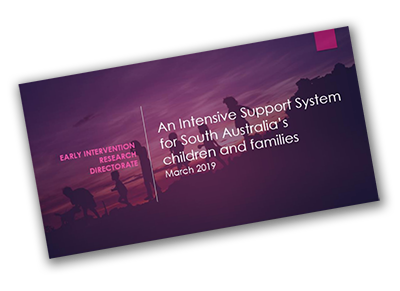
By Guardian Penny Wright and Malcolm Downes
The State Government’s newly announced strategy An Intensive Support System for South Australia’s children and families promises a more sustained and holistic response to child protection by shifting the focus to families. Under the strategy the Child and Family Assessment and Referral Networks (CFARNs), the Child Wellbeing Practitioner and Strong Start programs will be brought together in a new Intensive Support Unit to be formed in the Department for Human Services.
The family, in its many styles and structures, remains at the core of human society. It is how we care for each other, a basic economic unit, a basis for our sense of who we are, a psychological comfort and a vehicle for raising our children. It is also the site of some of our greatest problems, of violence, abuse and neglect. Over generations it can perpetuate our noblest aspirations but also nurture our darkest failings. For some families, problems with poverty, debt, unemployment, drug misuse, mental illness, family violence, insecure housing and contact with the justice system combine to create major barriers to the enjoyment of the relative wellbeing and wealth that our community has to offer.
Informed by the research commissioned on the back of the Nyland Royal Commission into the Child Protection System in SA, the Department’s planned Intensive Support Unit promises to focus squarely on the families with the most entrenched and challenging issues. It aims to work with families to identify issues they face and coordinate the services and supports they need in sustained way. In the past we have striven to ‘rehabilitate’ the individual young offender or ‘cure’ the person with a mental illness without regard for the social circumstances they came from and to which, in all likelihood, they will return. The Department’s new strategy will refocus the bulk of the family support, domestic violence and children’s support services that it provides and contracts on these families.
‘Troubled Families’
The rationale and structure resembles the Troubled Families program that has been in place in the United Kingdom since 2012. The program recently released its National evaluation of the Troubled Families Programme 2015-2020: Findings Evaluation overview policy report. In the UK program, intervention is based on a keyworker who builds an understanding of problems and of the individual family dynamics. They look at the totality of what’s going on and use what the report calls ‘a persistent and assertive approach establishing a relationship with the family and working closely with them to make sure the family resolve their problems’. The keyworker agrees on a plan with the family and local services so that interventions are sequenced and coordinated and there is a shared ownership of outcomes among service providers.
The evaluation report shows some headline gains including an almost one-third reduction in children being taken into care after a 19-24 month intervention and a one-quarter reduction in young people receiving custodial sentences. The economic benefits and net budget savings modeled in the report make a strong argument for the UK Government to persist with the program.
We should anticipate that the South Australian strategy, like Troubled Families, will encounter some challenges as it is rolled out. Services will need to adapt their practice, data collection and information sharing to a family-based way of working – and being funded. We can look to the NDIS as an example of the difficulties a change of service and funding model can produce for clients and providers if not well managed, no matter how well intended. The shift to a payment-by-results model can produce distortions in the provision of services and a gaming of the system if not well-conceived and managed from the outset.
Aboriginal families
Perhaps the biggest challenge for the new strategy will be how well it addresses the outcomes for Aboriginal families. The last Closing the Gap report confirmed that, after more than ten years of investment, we still struggle to provide services to the Aboriginal community that are culturally safe, trusted and effective. If we shift the focus to families we will have to understand and embrace an Aboriginal concept of family which is very different in how it operates to the white European model on which much of our current system is based. On top of that we will have to translate what words like ‘disadvantaged’, ‘troubled’, ‘struggling’, ‘complex’, and the many other policy terms governments use, mean to Aboriginal families. It will need to develop an understanding of how Aboriginal families define their needs and what success means to them.
To its credit, the new DHS strategy explicitly acknowledges the necessity for serious Aboriginal involvement in the design and governance of the new system and in the decisions that affect the lives of Aboriginal families and children. Getting this right for Aboriginal families will be a touchstone for the success of the strategy as a whole and its ability to serve the very diverse set of groupings and relationships that we call ‘family’ in the 21st Century.
